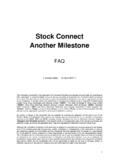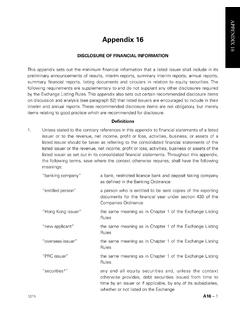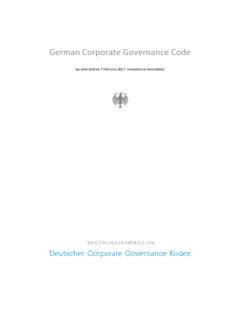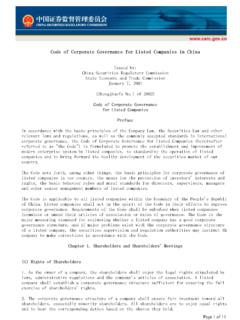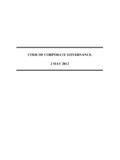Transcription of Appendix 14 Code on Corporate Governance Practices
1 Appendix 14 code on Corporate Governance PracticesThis code on Corporate Governance Practices sets out the principles ofgood Corporate Governance , and two levels of recommendations: (a) codeprovisions; and (b) recommended best practicesIssuers are expected to comply with, but may choose to deviate from, thecode provisions. The recommended best Practices are for guidance may also devise their own code on Corporate Governance Practices onsuch terms as they may consider must state whether they have complied with the code provisions setout in this code for the relevant accounting period in their interim reports(and summary interim reports, if any) and annual reports (and summaryfinancial reports, if any).
2 Every issuer must carefully review each code provision set out in this Codeand, where the issuer deviates from any of the code provisions, the issuermust give considered reasons:(a) in the case of annual reports (and summary financial reports), in theCorporate Governance Report which must be issued in accordance withAppendix 23; and(b) in the case of interim reports (and summary interim reports), either:(i)by giving considered reasons for each deviation; or(ii) to the extent that it is reasonable and appropriate, by referring tothe Corporate Governance Report in the immediately precedingannual report, and providing details of any changes together withconsidered reasons for any deviation not reported in that annualreport.
3 Such references must be clear and unambiguous and theinterim report (or summary interim report) must not only contain across-reference without any discussion of the the case of the recommended best Practices , issuers are encouraged, butare not required, to state whether they have complied with them and giveconsidered reasons for any OF GOOD Governance , CODEPROVISIONS AND RECOMMENDED BEST PRACTICESA. The BoardPrincipleAn issuer should be headed by an effective board which should assumeresponsibility for leadership and control of the issuer and be collectivelyresponsible for promoting the success of the issuer by directing andsupervising the issuer s affairs. Directors should take decisions objectivelyin the interests of the board should meet regularly and board meetings should beheld at least four times a year at approximately quarterly is expected that such regular board meetings will normallyinvolve the active participation, either in person or through otherelectronic means of communication, of a majority of directorsentitled to be present.
4 Accordingly, a regular meeting does notinclude the practice of obtaining board consent through thecirculation of written should be in place to ensure that, all directors aregiven an opportunity to include matters in the agenda for regularboard of at least 14 days should be given of a regular boardmeeting to give all directors an opportunity to attend. For all otherboard meetings, reasonable notice should be directors should have access to the advice and services of thecompany secretary with a view to ensuring that board procedures,and all applicable rules and regulations, are of board meetings and meetings of board committeesshould be kept by a duly appointed secretary of the meeting andsuch minutes should be open for inspection at any reasonable timeon reasonable notice by any of board meetings and meetings of board committeesshould record in sufficient detail the matters considered by theboard and decisions reached.
5 Including any concerns raised bydirectors or dissenting views expressed. Draft and final versions ofminutes of board meetings should be sent to all directors for theircomment and records respectively, in both cases within a reasonabletime after the board meeting is should be a procedure agreed by the board to enabledirectors, upon reasonable request, to seek independent professionaladvice in appropriate circumstances, at the issuer s expense. Theboard should resolve to provide separate independent professionaladvice to directors to assist the relevant director or directors todischarge his/their duties to the a substantial shareholder or a director has a conflict of interest ina matter to be considered by the board which the board hasdetermined to be material, the matter should not be dealt with byway of circulation or by a committee (except an appropriate boardcommittee set up for that purpose pursuant to a resolution passedin a board meeting)
6 But a board meeting should be non-executive directors who, and whose associates,have no material interest in the transaction should be present atsuch board :1 Directors are reminded of the requirement under rule that they mustabstain from voting on any board resolution in which they or any of theirassociates have a material interest and that they shall not be counted in thequorum present at the board meeting. The existing exceptions to the generalvoting prohibition are currently set out in note 1 to Appendix 3 .2 Such exceptions to the general voting prohibition should also be taken intoaccount when considering whether a substantial shareholder or a director hasa conflict of interest in a matter to be considered by the board.
7 If the relevantexceptions apply, a regular board meeting need not be held. For this purpose,please refer to for the meaning of a regular board Best issuer should arrange appropriate insurance cover in respect oflegal action against its committees should adopt, so far as practicable, the principles,procedures and arrangements set out in to Chairman and Chief Executive OfficerPrincipleThere are two key aspects of the management of every issuer - themanagement of the board and the day-to-day management of the issuer sbusiness. There should be a clear division of these responsibilities at theboard level to ensure a balance of power and authority, so that power isnot concentrated in any one roles of chairman and chief executive officer should beseparate and should not be performed by the same individual.
8 Thedivision of responsibilities between the chairman and chiefexecutive officer should be clearly established and set out : Under paragraphs 2(c)(vii) and 2(d) of Appendix 23, issuers must disclose in theirCorporate Governance Report the identity of the chairman and the chief executiveofficer and whether these two roles are segregated and the nature of any relationship(including financial, business, family or other material/relevant relationship(s)), if any,among members of the board and in particular, between the chairman and the chiefexecutive chairman should ensure that all directors are properly briefedon issues arising at board chairman should be responsible for ensuring that directorsreceive adequate information, which must be complete andreliable, in a timely Best of the important roles of the chairman is to provide leadershipfor the board.
9 The chairman should ensure that the board workseffectively and discharges its responsibilities, and that all key andappropriate issues are discussed by the board in a timely chairman should be primarily responsible for drawing up andapproving the agenda for each board meeting taking into account,where appropriate, any matters proposed by the other directors forinclusion in the agenda. The chairman may delegate suchresponsibility to a designated director or the company chairman should take responsibility for ensuring that goodcorporate Governance Practices and procedures are chairman should encourage all directors to make a full andactive contribution to the board s affairs and take the lead to ensurethat the board acts in the best interests of the chairman should at least annually hold meetings with the non-executive directors (including independent non-executive directors)
10 Without the executive directors The chairman should ensure that appropriate steps are taken toprovide effective communication with shareholders and that viewsof shareholders are communicated to the board as a chairman should facilitate the effective contribution of non-executive directors in particular and ensure constructive relationsbetween executive and non-executive Board compositionPrincipleThe board should have a balance of skills and experience appropriatefor the requirements of the business of the issuer. The board shouldensure that changes to its composition can be managed without unduedisruption. The board should include a balanced composition ofexecutive and non-executive directors (including independent non-executive directors) so that there is a strong independent element on theboard, which can effectively exercise independent judgement.


